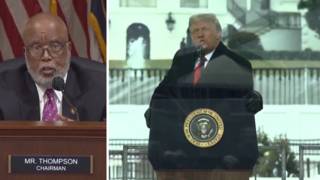
Guests
- Nikema WilliamsGeorgia Democratic congressmember and co-chair of the Congressional Voting Rights Caucus.
House lawmakers are set to vote to create a select committee that will investigate the deadly January 6 attack on the U.S. Capitol, while Republican leaders still aren’t saying whether they will participate in the panel. Congressmember Nikema Williams of Georgia says it’s vital to properly investigate the January 6 insurrection. “I experienced this attack on the Capitol my third day of being a member of Congress, having just been sworn in,” Williams says. “I signed up to serve the people, but I never imagined that I would be unsafe as a member of Congress.” Williams also discusses ongoing negotiations about infrastructure spending and the push to pass a sweeping voting rights bill.
Transcript
AMY GOODMAN: Congressmember Nikema Williams, while we still have you on, today the House is voting to create a select committee that will investigate the deadly January 6th attack on the U.S. Capitol, while House Republican leaders still aren’t saying whether they’ll participate in the panel. Can you explain what’s happening here, after they voted down having this bipartisan investigation of what happened, how this affected you as you first came into Congress, and the fact that the Department of Homeland Security has just issued a bulletin talking about possible extremist right-wing violence happening in August?
REP. NIKEMA WILLIAMS: So, I experienced this attack on the Capitol my third day of being a member of Congress, having just been sworn in. And it came at a very pivotal time for me, especially as a member representing Georgia. I had been up the entire night talking with media about our two U.S. Senate races that we just won here in Georgia. So the attack on the Capitol is juxtaposed against the winning two Senate seats in Georgia, sending a Black man and a Jewish man to represent the Deep South, and then me sitting in my office, getting ready to go on the floor and defend the Electoral College votes in Georgia. Seeing a Confederate flag paraded through the halls of, the rotunda of the United States Capitol was jarring to me, and this constant reminder that I’m operating in a system that wasn’t designed for or by people who look like me.
But, Amy, I am determined to make it work for all of us. And so, as we move forward, I clearly understand that there are some people who don’t think that I deserve to be here, and whether they are willing to say it as a member of the body that we’re serving in, they clearly support their constituents back home who uplift this mantra. And so, I applaud Speaker Pelosi for moving forward and coming up with the select committee, even if it is not bipartisan, because we have to get to the truth. We have to do the investigations, to do the hard work, have the hard conversations, so that we can keep people safe. When all of this first started, I started getting threats, death threats. I had to have security for me, my family. I have a 5-year-old son. And I signed up to serve the people, but I never imagined that I would be unsafe as a member of Congress.
AMY GOODMAN: I also wanted to ask you, Congressmember Williams, about the emerging so-called bipartisan infrastructure spending deal. President Biden went to La Crosse, Wisconsin, yesterday and said a failing infrastructure is, quote, “a drain on our economy.” The White House says the deal doesn’t include any new taxes. It would see the U.S. spend over $579 billion on new infrastructure over five years, with some $300 billion going to transportation, $100 billion earmarked for roads, bridges and other major projects. It does not include funding for major programs championed by progressives, including investments in green energy jobs and funds to combat the climate crisis, as we are experiencing the worst heat ever in this country, not to mention Canada, as well. Portland broke every record, one of the hottest places on the planet right now. That’s Portland, Oregon, just to name one place. In a moment, we’re going to talk about what happened in Florida with the catastrophic collapse and its connection, possibly, to the climate crisis. But what about this, the demand that the — linking the bipartisan infrastructure plan with the much larger one that Bernie Sanders and others are crafting?
REP. NIKEMA WILLIAMS: So, the House of Representatives has equal power in Congress to the Senate. And we need to make sure that the American people understand that, and, frankly, that the United States Senate understands that.
Speaker Pelosi has made it crystal clear that the House will only vote on the bipartisan deal once the larger infrastructure deal is passed through reconciliation. I applaud her for that, because we have some challenges in this country that we must address, and we have a once-in-a-lifetime opportunity to be bold and visionary as we rethink infrastructure, as we truly look at a transformational package that will help us build back better. That shouldn’t just be a tagline.
We can’t just go back to where we were before. We have to make sure that we’re coming out of this pandemic stronger than ever before, creating jobs for everyone and making vital investments for our future. And that includes things like making sure that child care is a part of what we think about when we think about infrastructure. Our care infrastructure keeps the economy going.
And so, I know that going too small and reaching this compromise will cost us so much more in the long run, and so I stand with my colleagues in the Congressional Progressive Caucus that this — we have to do both of these things concurrently.
JUAN GONZÁLEZ: Hello? Yes, Congresswoman, I just — I know you have to go, but I just want to ask you quickly about what — what are the key infrastructure needs of your state that you’re concerned about in this compromise measure? And could you talk about this magic of a trillion-dollar project with no new taxes?
REP. NIKEMA WILLIAMS: So, that is still being worked out. The infrastructure needs of each district, we’ve had an opportunity to weigh in on. I’ve done infrastructure tours of every city in Georgia’s 5th Congressional District. I’ve seen the bridges that need repair. I’ve seen the roads that need repair. I’ve seen also how we need to be addressing the inequities of the past and reconnecting communities, because the 1956 Federal Highway Act intentionally divided Black communities and decimated Black wealth in our country. Atlanta leads the country in being the worst in economic immobility and the racial wealth gap. And so, as we’re looking at how do we look at things in Atlanta that I know we need to do, like our bridges and our roads and our water systems, we also have to look at things that were done intentionally to some of our communities. And so, I have to always view this through an equity lens.
And what I do know about paying for this, anyone who makes less than $400,000 a year will not see one penny increase in their taxes. So, I am ready to move forward on this. I know that I have a lot of colleagues in the House that are with me on this. And we are just ready for the Senate to do their job, and we’re going to do ours.
AMY GOODMAN: Congressmember Nikema Williams of Georgia, thank you so much for being with us. We also want to thank Jorge Renaud of — the national criminal justice director for LatinoJustice.
Next up, we look at the catastrophic building collapse of Miami Beach, where 12 people are confirmed dead, 149 still missing. Could there be a link to the climate crisis and rising sea levels? We’ll speak with a scientist. Stay with us.













Media Options